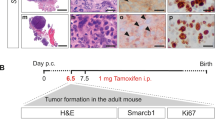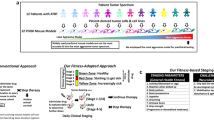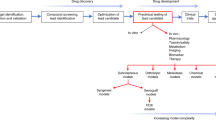Abstract
IN a previous communication Buttle, Eperon and Meiizies1 reported that injections of suspensions of human embryonic tissues into weanling rats prevented the growth of the transplantable human tumour HS.l when the animals were challenged 7 days later with tumour and then conditioned with cortisone. This communication reports similar experiments undertaken to study the inhibition of transplantable mouse tumours by using mouse embryonic tissue.
This is a preview of subscription content, access via your institution
Access options
Subscribe to this journal
Receive 51 print issues and online access
$199.00 per year
only $3.90 per issue
Buy this article
- Purchase on SpringerLink
- Instant access to full article PDF
Prices may be subject to local taxes which are calculated during checkout
Similar content being viewed by others
References
Buttle, G. A. H., Eperon, J., and Menzies, D. N., Lancet, ii, 12 (1964).
Haddow, A., and Horning, E. S., J. Nat. Cancer Inst., 24, 109 (1960).
Douglas, G. W., Thomas, L., Carr, M., Cullen, N. M., and Morris, R., A mer. J. Obstet. Gynec., 78, 960 (1959).
Canlas, B. D., Obstet. Gynec., 20, 602 (1962).
Author information
Authors and Affiliations
Rights and permissions
About this article
Cite this article
BUTTLE, G., FRAYN, A. Effect of Previous Injection of Homologous Embryonic Tissue on the Growth of Certain Transplantable Mouse Tumours. Nature 215, 1495–1497 (1967). https://doi.org/10.1038/2151495a0
Received:
Revised:
Issue date:
DOI: https://doi.org/10.1038/2151495a0
This article is cited by
-
Foetal Antigens Cross-reactive with Tumour-specific Transplantation Antigens
Nature New Biology (1973)
-
Immunological Cross-reactivity of Antigens common to Tumour and Foetal Cells
Nature (1972)
-
Foetal “Antigens” in Cancer
Nature (1972)
-
Recent advances in immunologic diagnosis of digestive tract cancer
The American Journal of Digestive Diseases (1970)



